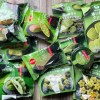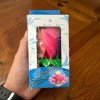
Tokyo Metropolitan Police want to serve just desserts.
When you hear about anime copyright violation in Japan, the culprit tends to be someone selling unlicensed DVDs, posters, or figures. This week, though, the Tokyo Metropolitan Police busted someone for selling bootleg anime cakes.
On Tuesday, charges were officially filed against a 34-year-old woman living in Tokyo’s Shibuya district. Starting in the summer of 2019, the woman began making and selling cakes decorated with chocolate pen drawings of the cast of Demon Slayer: Kimetsu no Yaiba.
The woman conducted the Demon Slayer cake business through her Instagram account, and customers would send her image files of the artwork they wanted her to use for their cakes, with prices ranging from roughly 13,000 to 15,000 yen (US$114 to US$132). The woman was able to sell hundreds of Demon Slayer cakes in this manner, with estimates of her earnings being as high as 6.5 million yen (US$57,100).
▼ The cakes
Eventually Demon Slayer’s rights holders stumbled onto her operation and reported it to the police. “I knew what I was doing was wrong, but I didn’t think I’d be able to sell ordinary cakes,” the woman said in her statement.
Whenever charges are brought against someone in Japan for derivative works of anime art, “But what about doujinshi?” is a question that gets quickly raised. It’s worth remembering, though, that sales of fan art aren’t so much legally protected in Japan as they are benevolently tolerated by rights holders, and even then there’s a collection of unspoken agreements that fan artists are expected to abide by. In essence, most anime publishers agree to turn a blind eye to fan art as long as it’s produced in small batches and offered for a limited time only at in-person events. That bundle of conditions, ostensibly, contextualizes any money earned as coverage of the costs of artistic expression, not economically motivated profit.
The actions of the Demon Slayer cake maker don’t really check those boxes, though, seeing as how she was running a continuing enterprise through the Internet and her self-admitted reason for using the anime’s characters wasn’t because it was the most artistic way she could express her love of the series, but because she wanted to increase the number of cakes she could sell. Reproducing official art, as opposed to creating her own original chocolate pen drawings of the characters, would also probably preclude any sort of “edible doujinshi” type of defense.
As with the recent charges against a man for “destroying” the A.I. censor mosaic in Japanese adult videos, it doesn’t appear like the woman would have gotten in any trouble if she was merely making the cakes and posting photos of them online for her own amusement. It’s the selling of the cakes and soliciting commissions for them that the rights holders take issue with, and even then, it’s possible she could have gotten a pass if she’d followed the doujin code. But like Icarus, she soared too high in her ambitions, and now her figurative wings have melted like so much chocolate left in the oven for too long.
Sources: Yahoo! Japan News/Kyodo, NHK News Web
Top image ©SoraNews24
● Want to hear about SoraNews24’s latest articles as soon as they’re published? Follow us on Facebook and Twitter!

 Tokyo woman in trouble with the law after selling high-priced Evangelion bootleg posters
Tokyo woman in trouble with the law after selling high-priced Evangelion bootleg posters Hayao Miyazaki considers Demon Slayer his rival, Studio Ghibli producer says
Hayao Miyazaki considers Demon Slayer his rival, Studio Ghibli producer says Kyoto man arrested for opening packs of Demon Slayer key chains until finding one he wanted
Kyoto man arrested for opening packs of Demon Slayer key chains until finding one he wanted Tokyo couple caught making stickers with police mascot flipping bird
Tokyo couple caught making stickers with police mascot flipping bird Surprisingly strong Hokkaido woman arrested for poking holes in 13 expensive melons with finger
Surprisingly strong Hokkaido woman arrested for poking holes in 13 expensive melons with finger Foreigner’s request for help in Tokyo makes us sad for the state of society
Foreigner’s request for help in Tokyo makes us sad for the state of society Japanese city loses residents’ personal data, which was on paper being transported on a windy day
Japanese city loses residents’ personal data, which was on paper being transported on a windy day Historical figures get manga makeovers from artists of Spy x Family, My Hero Academia and more
Historical figures get manga makeovers from artists of Spy x Family, My Hero Academia and more Harajuku Station’s beautiful old wooden building is set to return, with a new complex around it
Harajuku Station’s beautiful old wooden building is set to return, with a new complex around it Mt. Koya planning to instate visitor’s tax to cope with huge tourist numbers
Mt. Koya planning to instate visitor’s tax to cope with huge tourist numbers Ghibli Park now selling “Grilled Frogs” from food cart in Valley of Witches
Ghibli Park now selling “Grilled Frogs” from food cart in Valley of Witches Red light district sushi restaurant in Tokyo shows us just how wrong we were about it
Red light district sushi restaurant in Tokyo shows us just how wrong we were about it Is Japan’s massive Shizuoka steak sandwich really as delicious as it looks in promo photos?
Is Japan’s massive Shizuoka steak sandwich really as delicious as it looks in promo photos? Family Mart makes matcha dreams come true with new lineup of strong green tea sweets in Japan
Family Mart makes matcha dreams come true with new lineup of strong green tea sweets in Japan Celebrate another year of life by putting it in jeopardy with this birthday candle flower
Celebrate another year of life by putting it in jeopardy with this birthday candle flower McDonald’s new Happy Meals offer up cute and practical Sanrio lifestyle goods
McDonald’s new Happy Meals offer up cute and practical Sanrio lifestyle goods Japanese ramen restaurants under pressure from new yen banknotes
Japanese ramen restaurants under pressure from new yen banknotes French Fries Bread in Tokyo’s Shibuya becomes a hit on social media
French Fries Bread in Tokyo’s Shibuya becomes a hit on social media Studio Ghibli releases new action figures featuring Nausicaä of the Valley of the Wind characters
Studio Ghibli releases new action figures featuring Nausicaä of the Valley of the Wind characters New private rooms on Tokaido Shinkansen change the way we travel from Tokyo to Kyoto
New private rooms on Tokaido Shinkansen change the way we travel from Tokyo to Kyoto Tokyo Tsukiji fish market site to be redeveloped with 50,000-seat stadium, hotel, shopping center
Tokyo Tsukiji fish market site to be redeveloped with 50,000-seat stadium, hotel, shopping center All-you-can-drink Starbucks and amazing views part of Tokyo’s new 170 meter-high sky lounge
All-you-can-drink Starbucks and amazing views part of Tokyo’s new 170 meter-high sky lounge Beautiful Ghibli sealing wax kits let you create accessories and elegant letter decorations【Pics】
Beautiful Ghibli sealing wax kits let you create accessories and elegant letter decorations【Pics】 Studio Ghibli releases Kiki’s Delivery Service chocolate cake pouches in Japan
Studio Ghibli releases Kiki’s Delivery Service chocolate cake pouches in Japan New definition of “Japanese whiskey” goes into effect to prevent fakes from fooling overseas buyers
New definition of “Japanese whiskey” goes into effect to prevent fakes from fooling overseas buyers Our Japanese reporter visits Costco in the U.S., finds super American and very Japanese things
Our Japanese reporter visits Costco in the U.S., finds super American and very Japanese things Studio Ghibli unveils Mother’s Day gift set that captures the love in My Neighbour Totoro
Studio Ghibli unveils Mother’s Day gift set that captures the love in My Neighbour Totoro More foreign tourists than ever before in history visited Japan last month
More foreign tourists than ever before in history visited Japan last month New Pokémon cakes let you eat your way through Pikachu and all the Eevee evolutions
New Pokémon cakes let you eat your way through Pikachu and all the Eevee evolutions Sales of Japan’s most convenient train ticket/shopping payment cards suspended indefinitely
Sales of Japan’s most convenient train ticket/shopping payment cards suspended indefinitely Sold-out Studio Ghibli desktop humidifiers are back so Totoro can help you through the dry season
Sold-out Studio Ghibli desktop humidifiers are back so Totoro can help you through the dry season Japanese government to make first change to romanization spelling rules since the 1950s
Japanese government to make first change to romanization spelling rules since the 1950s Ghibli founders Toshio Suzuki and Hayao Miyazaki contribute to Japanese whisky Totoro label design
Ghibli founders Toshio Suzuki and Hayao Miyazaki contribute to Japanese whisky Totoro label design Doraemon found buried at sea as scene from 1993 anime becomes real life【Photos】
Doraemon found buried at sea as scene from 1993 anime becomes real life【Photos】 Tokyo’s most famous Starbucks is closed
Tokyo’s most famous Starbucks is closed One Piece characters’ nationalities revealed, but fans have mixed opinions
One Piece characters’ nationalities revealed, but fans have mixed opinions We asked a Uniqlo employee what four things we should buy and their suggestions didn’t disappoint
We asked a Uniqlo employee what four things we should buy and their suggestions didn’t disappoint Princesses, fruits, and blacksmiths: Study reveals the 30 most unusual family names in Japan
Princesses, fruits, and blacksmiths: Study reveals the 30 most unusual family names in Japan Demon Slayer anime restaurant coming to Universal Studios with Hashira meals, life-size figures
Demon Slayer anime restaurant coming to Universal Studios with Hashira meals, life-size figures Tokyo Demon Slayer store’s edible “bamboo tubes” are surprisingly phallic-looking, fans find
Tokyo Demon Slayer store’s edible “bamboo tubes” are surprisingly phallic-looking, fans find Japan’s BPO media watchdog organization responds to complaints about Demon Slayer
Japan’s BPO media watchdog organization responds to complaints about Demon Slayer Demon Slayer popcorn bucket sells out to huge crowds at Universal Studios Japan
Demon Slayer popcorn bucket sells out to huge crowds at Universal Studios Japan In Luffy we trust – Man arrested for selling dollar bills with unlicensed One Piece stickers
In Luffy we trust – Man arrested for selling dollar bills with unlicensed One Piece stickers 23-year-old Tokyo policewoman falls in movie-style love with yakuza member, real life ensues
23-year-old Tokyo policewoman falls in movie-style love with yakuza member, real life ensues Demon Slayer pulls off feat no other series has done with Japan’s biggest anime magazines【Pics】
Demon Slayer pulls off feat no other series has done with Japan’s biggest anime magazines【Pics】 Moms vs. demon slayers — Japanese grade schoolers asked: “Who do you respect most and why?”
Moms vs. demon slayers — Japanese grade schoolers asked: “Who do you respect most and why?” Woman in short skirt arrested after inciting upskirt photography in Tokyo
Woman in short skirt arrested after inciting upskirt photography in Tokyo Demon Slayer teams up with beef bowl chain to excite fans, test their dexterity with Tanjiro bowl
Demon Slayer teams up with beef bowl chain to excite fans, test their dexterity with Tanjiro bowl Is the Universal Studios Japan Demon Slayer ride worth riding if you’re not a Demon Slayer fan?
Is the Universal Studios Japan Demon Slayer ride worth riding if you’re not a Demon Slayer fan? Tokyo Skytree to light up in Demon Slayer character colors as part of tie-up event with anime hit
Tokyo Skytree to light up in Demon Slayer character colors as part of tie-up event with anime hit Turning your cake into an awesome-looking 2-D cake like this is quick and simple【Photos】
Turning your cake into an awesome-looking 2-D cake like this is quick and simple【Photos】 Demon Slayer manga creator offers a motivational illustration during the pandemic
Demon Slayer manga creator offers a motivational illustration during the pandemic Slayers cafe opening in Tokyo and Osaka brings food of the fantasy anime to real life【Photos】
Slayers cafe opening in Tokyo and Osaka brings food of the fantasy anime to real life【Photos】
Leave a Reply